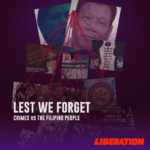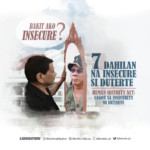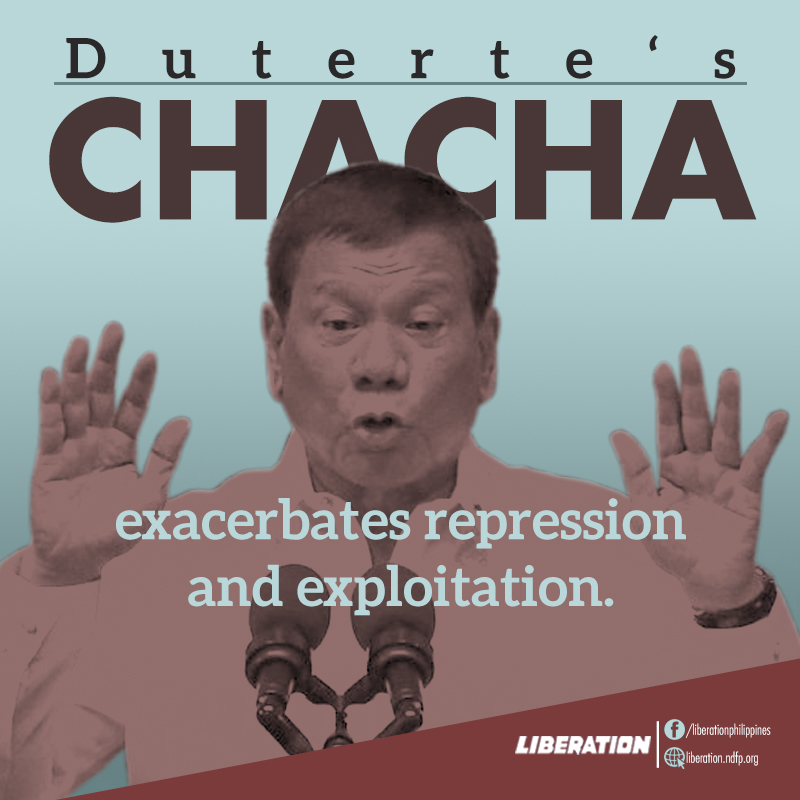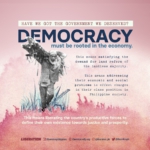Challenge to the open democratic mass movement: OPPOSE A NEW DICTATORSHIP VIA CHARTER CHANGE!
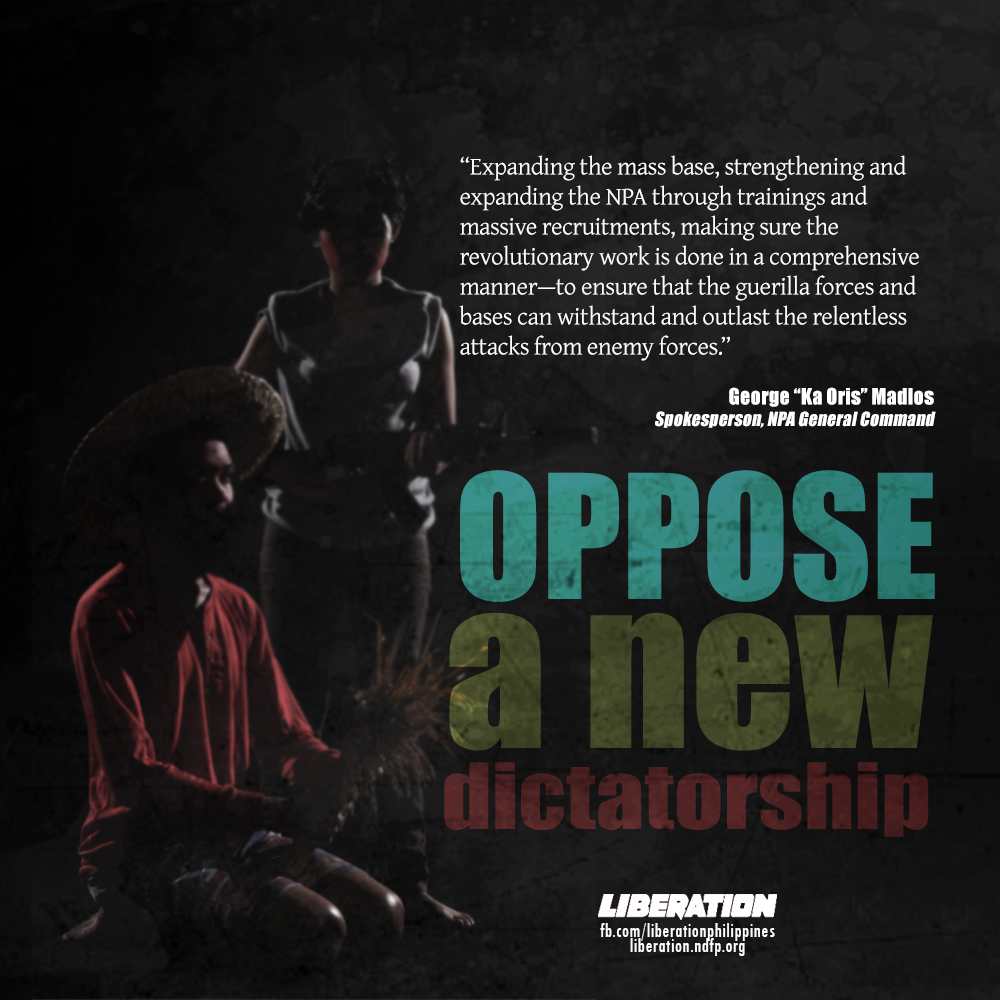
by Angel Balen
On February 24, on the 32nd anniversary of the ouster through popular uprising of the 14-year US-Marcos dictatorship, coordinated protest actions nationwide centered on the call: Oppose the Duterte fascist regime’s Charter change proposals, frustrate the scheme to install a dictatorship!
The proposed charter changes, now pending in the House of Representatives (dominated by a “supermajority” of mostly traditional political turncoats belonging to political dynasties), are correlated with President Duterte’s drive to shift the form of government from the current unitary to a federal system. Such a shift has by itself raised doubts and concerns over the perils of the big rush to push it through. The latest target is before the end of 2019.
What perils? Three interrelated matters: The shift to federalism would enable all the incumbent elective officials (legislative and executive), so many of them corrupt and abusive, to remain in their posts throughout—and most probably even beyond—the transition period from unitary to federal. It would break up the Philippines into regional states that would add a new layer of bureaucracy, red tape, and political largesse and expand the powers of entrenched political dynasties and warlords; and it would enshrine in the prospective constitution the discredited pork barrel system, which would fatten these greedy politicians to no end.
From where does the threat of dictatorship emanate? It would be during that transition period—suggested at nearly 12 years by the PDP-Laban ruling party proposal—that President Duterte (as the incumbent) would be granted oversight power over all branches of government (executive, legislative, and judiciary), constitutional bodies, independent bodies, departments, agencies and offices of the government. In effect, he could exercise absolute powers as the dictator Marcos did for 14 years.
All the above should not be allowed to happen.
Other pernicious proposals
Moreover, highly pernicious to the national interest and the people’s welfare are the many proposals to delete or water down provisions of the 1987 Constitution. These provisions largely embody the sovereign, libertarian, democratic, and humanitarian principles and aspirations of the Filipino people that impelled them to struggle hard to oust the US-Marcos dictatorship. Among the proposals are the following:
- Delete or water down progressive and protectionist provisions on the national economy and patrimony, including limits on foreign ownership of land, public utilities, media and educational institutions, and preference for Filipino enterprises and professionals;
- Delete or water down provisions on social justice and human rights, particularly the right to security of tenure and living wage [for workers], agrarian reform [for peasants and farmworkers], and urban land reform and housing [for the urban poor];
- Limit the exercise of the people’s sovereign will to mere suffrage [voting in elections], and the freedom of the press, free expression, assembly and redress of grievances to their “responsible” exercise; and
- Delete or water down provisions prohibiting foreign military bases, troops, facilities as well as nuclear weapons in the country.
None of the above proposals should be allowed to pass. These are the most anti-people changes to the constitution ever put forward.
Three previous presidents—Fidel V. Ramos, Joseph Estrada, and Gloria M. Arroyo—attempted to change parts of the 1987 Constitution. The first two attempts sought mainly to enable the sitting president to remain in power, the third aimed to allow foreigners to own lands in the country and open foreign participation in fields reserved only to Filipinos. Each attempt was frusrated by a show of strong popular opposition.
Because the Duterte regime’s charter change is far worse than the previous three, all the more must the open democratic mass movement endeavor to harness all available means to stop it.
Movement Against Tyranny
The above proposed changes to the 1987 Constitution are among those cited in a unity statement of the No to Cha-cha Coalition, formed on February 13, 2018, through the initiative of the Movement Against Tyranny (MAT). The unity statement bears a long title: “Uphold democracy, sovereignty, social justice and human rights! No to Charter change!” It has been circulated for signatures of endorsement for anyone interested to join the fight.
The MAT itself was formed only on August 28, 2017. Its aim: “To unite all freedom-loving Filipinos against tyranny and build a broad front to counter the increasing fascism and militarist rule of the Duterte government.” Its formation at the national level, with counterparts being organized at regional level around the country, was a timely response to the need for more unified and vigorous popular actions in confronting the Duterte fascist regime.
The formation of the MAT was coordinated by the Bagong Alyansang Makabayan, which has been the mobilizing center for the multisectoral progressive forces in the open/legal democratic mass movement since its founding on May 5, 1985 (in the waning days of the US-Marcos dictatorship).
As soon as it was formed, MAT’s convenors announced its initial mass protest action: a broad-based huge rally at the Luneta Park on September 21, coinciding with the 45th year of the declaration of martial law by Ferdinand E. Marcos.
The September 21 protest rally at the Luneta Park proved to be a magnet that attracted people from all walks of life to join. Over 21,000 organized progressive forces were mobilized, but the unorganized and those not within the loop of the progressive mass movement exceeded their number. At the height of the activity, and despite the rain, the crowd rose to 44,000.
Students from various schools, colleges and universities constituted the bulk of the crowd. The rally also served as a reunion for veteran anti-martial law/anti-Marcos dictatorship activists and former political prisoners, who exchanged recollections of their experiences and enthusiastically chanted: “Never again! Never again to martial law!”
A report on the gathering by the online Bulatlat news website said in part:
“The crowd was a friendly, cheerful mix of old and young. There were school kids, millennials, middle-aged and seniors. Their placards and printed-out tarpaulins were witty, yet angry and committed to fighting the return of, or tendencies toward, martial law, against extrajudicial killings, corruption and tyranny. They clapped, chanted and sang as a group and many stayed despite the rain towards the end of the program.”
Movie and stage actors, professional singers, musical bands, and a full contingent of theater artists of the Philippine Educational Theater Association (PETA) performed. They launched a Filipino version of the Les Miserables musical piece, “Do You Hear the People Sing?” and capped the rally with the signature protest song, “Bayan Ko,” of the 1986 “people power” uprising.
The next big rally under the auspices of the Movement Against Tyranny was the December 10 International Human Rights Day march-rally. The bulk of the marches first gathered at Liwasang Bonifacio, then marched to the Andres Bonifacio Shrine near the Manila City Hall, where fiery speeches were delivered, interspersed with songs and cultural presentations. Before dusk the animated protesters marched with lighted torches to Mendiola near Malacanang Palace. There Duterte’s effigy was burned amidst chantings and flag waving of the various participating organizations.
It was at the Bonifacio Shrine program where a group of artists, journalists and other media practitioners made a call: “Let us organize for democracy and integrity.” From that call was born an organization named LODI, which has vowed to challenge Duterte’s public information machinery, fact-check his pronouncements and those by his aides and supporters who command an online following. LODI’s initial statement said:
“Duterte himself has led the assault on freedom of expression and disinformation campaigns, aided by a well-oiled machinery of disinformation peddlers and digital storm troopers. Duterte’s attacks on media companies whom he had accused of unfair reportage have been amplified by a well-funded social media army, in part underwritten by taxpayers.”
“It is not enough to call for a halt to government-led disinformation campaigns,” LODI emphasized. “We will expose these deceptions,” it vowed.
No more turnarounds for Duterte?
Since he unraveled himself as a fascist—a fascist compliant to US imperialism—early in his second year as president, Rodrigo R. Duterte appears to hold no thought of turning back or reconsidering the often rash actions he took on specific occasions. This is specifically so with regard to his curt statement, addressed to the revolutionary movement and the organized masses with whom he had earlier avowed a long-running friendship, even affinity: “I am your enemy!”
No more falterings and turnarounds that characterized his first year in office?
Duterte’s fascist regime has unrelentingly pushed its “all-out [counterinsurgency] war” against the Communist Party of the Philippines-New People’s Army (CPP-NPA) since February 2017. That month saw the abrupt ending of five months of tenuous reciprocal unilateral ceasefire declarations, during which period three rounds of formal negotiation in the GRP-NDFP peace talks (that had begun in August 2016) were successfully held in Europe.
After a relatively successful fourth negotiation round in April (with the GRP failing to comply with an agreement, during the back-channel discussions in March, to restore the reciprocal unilateral ceasefires), Duterte began playing a go-stop-go-stop game on the peace talks.
He cancelled the fifth round as it was scheduled to start in May. He set back-channel discussions for the fifth round in August but cancelled these in July. With his go-signal, two productive back-channel discussions took place in October and early November, hammered out three documents prepared for initialing or signing. But on November 22, as the fifth round of formal negotiations was about to begin in Oslo to take up the three documents, Duterte ordered the cancellation of “all talks with the Left.” The following day he issued Proclamation 360 formally terminating the peace talks.
However, the GRP has not sent a formal notification to the NDFP Executive Council, as protocol requires, terminating the 1995 Joint Agreement on Safety and Immunity Guarantees (JASIG). Once acknowledged by the NDFP, the notice of termination of the JASIG and the peace talks will take effect 30 days after such acknowledgment. Absent that, the GRP-NDFP peace talks are deemed to be indefinitely suspended.
Tagging the CPP-NPA as “terrorist”
On December 5, 2017, Duterte issued Proclamation 374, formally declaring the CPP-NPA as a “designated/identified terrorist organization” in accordance with two anti-terrorism laws of the reactionary government, legislated at the instance of the US government. That presidential act has upped the ante of state antagonism towards the Left revolutionary movement and the virulence of its “all-out war.”
However, the terrorist tagging or “proscription” cannot instantly take legal effect, no matter that it’s a presidential proclamation. According to the anti-terrorism law it invokes, the GRP justice department must first file a petition before a regional trial court seeking the latter’s approval. The process entails going through public hearings (purportedly to hear both sides, similar to public trials) before the court can issue a decision. (Such a process took five years to conclude, for instance, before a Mindanao RTC branch declared the Abu Sayyaf group as a terrorist organization.)
Up to this writing, the GRP justice department hasn’t filed a petition. Yet the state security forces have already exploited Proclamation 374 to intensify their villification attacks on the CPP-NPA and against legal progressive organizations that they obdurately tag as “fronts” or “supporters” of the CPP-NPA. During a successful jeepney drivers’ strike against the government’s costly motor vehicle modernization program, called by Piston and supported by the Kilusang Mayo and the human rights alliance Karapatan, Duterte himself accused the three organizations of being allied with the CPP-NPA. He erroneously threatened to charge them with rebellion—of rising up in arms against the government).
Pleased with himself
As matters stand, Duterte appears pleased with himself and with what he has been doing and saying (repeatedly before various audiences around the country) to harass, insult and threaten his perceived enemies. Among his frequent targets for vitriol are human rights defenders, within the country and abroad. He brushes aside their call for a stop to the extrajudicial killings (both in carrying out his “war on illegal drugs” and the counterinsurgency campaign) and for justice to the victims of human rights violations.
When peasants from Mindanao, Visayas, and Luzon undertook a 10-day journey to Manila to demand fulfillment of his promises to them and to stop the killing of farmers (at the time the victims numbered 99, now 111), Duterte desisted from meeting with them. He didn’t make any statement at all. He also ignored the pleas of the Moros and indigenous peoples of Mindanao (Duterte’s home region), who had likewise journeyed for several days, encamped at the University of the Philippines Diliman campus for over a month, and rallied before the AFP headquarters and various government offices. They demanded positive actions on their problems, among others an end to the militarization of their communities, the shutdown of their schools, and the lifting of martial law in Mindanao.
Vis-à-vis organized labor, Duterte has hedged on signing an Executive Order abolishing contractualization (one of his electoral campaign promises), which he had asked the combined conservative and militant trade union formations to draft and which the secretary of labor has already approved.
Expressing irritation over media reports critical of his governance and pronouncements, Duterte routinely made veiled threats to certain journalists and media establishments, and caused the issuance of an order to close down a leading online news website, Rappler.
Duterte has spoken most venomously and disparagingly against the New People’s Army, accusing the latter of continually killing “my soldiers and my policemen.” After dining in Malacanang with alleged “former leftist rebels,” he facetiously suggested that women revolutionary fighters shouldn’t be killed but should be shot in their genitals to render them “useless”. And speaking to representatives of indigenous people’s tribes assembled by the military in Davao, he instigated them to kill NPA Red fighters, instead of joining or supporting them. He even offered to pay P20,000 (later increasing it to P25,000) as reward for every NPA member they could kill—who could very well be a fellow tribesman. (Duterte had earlier claimed that 90 percent of the NPA members in one Mindanao area are indigenous people.)
Puppetry to US imperialism
Regarding the fascist Duterte being a compliant vassal or puppet of US imperialism, here’s a stark proof.
A US government report issued last month confirmed that, back in September 2017, the Trump administration had launched Operation Pacific Eagle as the US military’s “new” overseas contingency operations in the Asia-Pacific region. And it got the Duterte regime to complicitly agree to allow American special operations forces to accompany AFP troops in ALL their missions against violent “extremist” or “terrorist” armed groups, especially in Mindanao.
Actually, Operation Pacific Eagle is a revival of George W. Bush’s Operation Enduring Freedom in his notorious “war on terror” that began in the last quarter of 2001.
During the so-called siege of Marawi by alleged Islamic State affiliates, the Maute and Hapilon-led Abu Sayyaf groups, the US military played a key role in using sophisticated aircraft and drones to identify targets for the daily aerial bombings and artillery bombardment that flattened Marawi City. Duterte was fulsome in thanking them. The Americans has exploited as a convenient justification for launching Operation Pacific Eagle-Philippines the need for US troops to continue supporting the Duterte regime in suppressing the remnants of the alleged IS affiliates that it claims have regrouped and are aggressively recruiting new members in Mindanao.
In turn, having declared the CPP-NPA as a “terrorist organization,” the Duterte regime likewise has found it convenient to allow fully-armed American special operation troops to be directly involved in carrying out its counterinsurgency program, deviously misnamed Oplan Kapayapaan, against the CPP-NPA. It so happens that the bulk of the armed strength of the CPP-NPA is in Mindanao. Thus, it’s there where the AFP has been concentrating much of its counterinsurgency resources and operations. Oplan Kapayapaan will now be conflated with the “anti-terrorism” campaign against the alleged IS affiliates.
Taking advantage of martial law
Those who launched Operation Pacific Eagle in a low-key manner in September, without publicly announcing its nature and implications, took advantage of the extended implementation of martial law in Mindanao. Martial law has been in effect in the whole of Mindanao since Duterte imposed it in May 2017 in connection with the “siege of Marawi.” Despite the ending of the five-month devastating war in Marawi, military rule has been extended up to the end of 2018. Although the claimed regrouping and recruitment of the alleged IS affiliates was invoked as primary basis, the strong presence of the NPA in the region has been anomalously added as basis to justify the extension.
Duterte has even warned that if the CPP-NPA stepped up armed operations elsewhere in the country he wouldn’t hesitate to declare martial law nationwide.
With these developments, more American troop infusions and more military facilities construction inside Philippine military bases and camps (allowed under the EDCA) can be expected in the coming months or years. It’s not farfetched that such military facilities buildup will be utilized as platforms by the Trump administration for launching military interventionist actions in any country in Asia-Pacific. Such US aggression from US facilities here can implicate the Philippines. Extended US military basing in the country (without a formal bases agreement) can also boost America’s capability for military maneuvers vis-à-vis its rival China over military and geopolitical dominance in the South China Sea and further in the Asia-Pacific region.
Definitely, these developments pose a challenge to the open democratic mass movement to strengthen its anti-imperialist flank before Operation Pacific Eagle can put in place its military interventionist programs. A vigorous campaign against Trump’s reviving in Asia-Pacific Bush-era’s Operation Enduring Freedom can logically be fused with the No to Charter Change campaign, specifically as it connects with the existing constitutional ban on foreign military bases, troops and facilities in the Philippines.###

